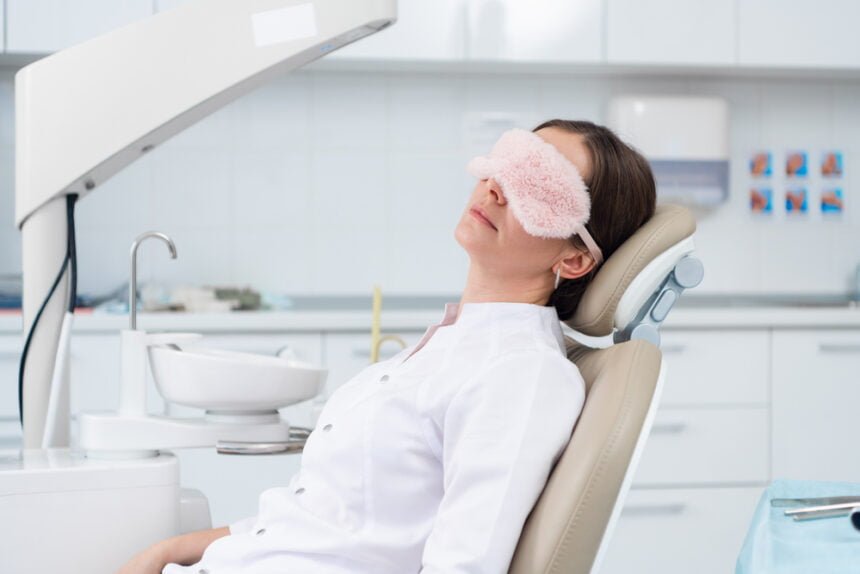Do you have any dental issues but have yet to seek treatment? Like many people, you may be scared of dental procedures. If that’s the case, fear no more. Your dentist will likely prescribe a sleep or sedation procedure to help you sleep or relax. These medications and treatments are safe and effective. If it’s your first time to come across such terms, continue reading to learn more about them.
What Is Sleep Dentistry?
As the name suggests, sleep dentistry uses typical anesthesia to help patients fall asleep. Once the medication takes full effect, the patient becomes unconscious and unaware of the oral treatment performed.
Sleep dentistry is usually prescribed for patients with special needs or challenging behaviors. Nevertheless, a patient must undergo a thorough pre-operative assessment performed by professional dentists and anesthesia experts to understand their medical history before commencing with sleep dentistry.
What Is Sedation Dentistry?
Unfortunately, many people refer to sedation dentistry as sleep dentistry. This information is misleading since during sleep dentistry, a patient stays asleep the entire time. In sedation dentistry, on the other hand, reputable professionals such as dentist Dr. Luther provide their patients with sedation medication that helps them relax but not fall asleep. Mainly, sedation dentistry is prescribed for patients terrified of dental procedures.
There are four levels of dentistry sedation. They include:
- Minimal sedation: This type of sedation helps patients relax while they’re still awake during the treatment.
- Moderate sedation: Patients undergoing moderate sedation stay awake during the procedure, but they experience challenges speaking and might not remember much about the treatment.
- Deep sedation: A patient undergoing deep sedation stays between consciousness and sleeping.
- General anesthesia: This type of sedation dentistry puts patients in a state of unconsciousness.
A dentist prescribes the type of sedation based on the patient’s level of anxiety, the severity of the condition, and how long the treatment takes.
What Are The Differences Between Sleep And Sedation Dentistry?
Both sleep and sedation dentistry is designed to help patients relax and overcome dental anxiety. However, these dentistry procedures differ in several ways. For example, as already mentioned, sleep dentistry helps a patient fall and stay asleep during the entire oral treatment. Even after waking up, a patient who underwent sleep dentistry doesn’t remember anything about the treatment.
On the other hand, sedation dentistry enables patients’ muscles to relax and doesn’t make them fall asleep. You remain conscious, and you can answer your dentist by nodding. After this procedure, you’ll likely remember some details about the treatment.
Generally, sedation and sleep dentistry is safe since your doctor won’t prescribe any of them before assessing your condition and if you’re likely to experience severe side effects. Nevertheless, to be sure these procedures are safe, ensure to work with a reputable dentist to avoid complications.
Which Is The Safest Between Sleep And Sedation Dentistry?
Sleep and sedation dentistry is safe when administered by a trained dentist. If your doctor prescribes sleep dentistry, they’ll monitor you during the procedure and adjust the dosage accordingly. At some point, your dentist can use a particular medication to reverse the effect if there’s a need to wake you.
While sedation dentistry is safe when administered by a professional, people with conditions like obesity or obstructive sleep apnea might not be ideal for such treatment. This is because such individuals might develop severe complications from the anesthesia. However, your dentist will study your medical history before prescribing these treatments to avoid risking your well-being.
Risks Of Sleep Dentistry
While sleep dentistry is safe, it comes with some side effects. For example, you’ll likely experience drowsiness, dry mouth, nausea, and headaches. Fortunately, these effects aren’t severe and don’t last for long. Your dentist will also advise you on how to improve them to avoid complications.
Risks Of Sedation Dentistry
Side effects associated with sedation dentistry include headaches, nausea, and dizziness. Additionally, the relaxing effects of sedative dentistry cause your respiratory system to relax and stop to work correctly. However, the dentist remains attentive to ensure nothing goes wrong during the procedure.
When Is Sleep Or Sedation Dentistry Necessary?
After visiting a dentist’s office, they’ll assess your situation and health history to determine which dentistry method fits you. Sedation dentistry is used when performing basic dental health procedures, such as cleaning and non-invasive treatments. On the other hand, sleep dentistry is preferred for invasive procedures or patients with extreme dental anxiety.
The use of sedation or sleep dentistry can greatly benefit patients who may have difficulty sitting still for long periods of time or experience extreme discomfort during dental procedures—for example, patients with physical or mental disabilities or medical conditions that make it difficult to tolerate dental treatments. Ultimately, the decision to use sedation or sleep dentistry will depend on the specific needs and circumstances of each patient, and it’s always important to consult with a qualified dental professional to determine the most appropriate course of action.
Conclusion
Dental health is vital for your general well-being. It doesn’t only affect your smile but also plays a massive role in your heart health. For this reason, it’s essential to maintain dental health and seek treatment whenever you think something’s wrong.
Unfortunately, some avoid dental checkups and treatment because they have dental anxiety. Luckily, dentists use sleep and sedation medication to help you fall asleep or relax during dental procedures. These medications are safe if administered by a professional dentist and don’t have severe side effects.
If you experience issues with your oral health and are scared of treatments, fear no more. With either sleep or sedation dentistry, you won’t experience any pain or fear during the entire treatment procedure.









